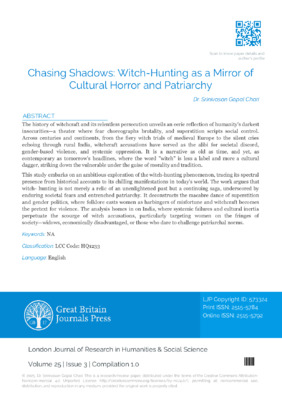Chasing Shadows: Witch-Hunting as a Mirror of Cultural Horror and Patriarchy
Abstract
The history of witchcraft and its relentless persecution unveils an eerie reflection of humanity�s darkest insecurities�a theater where fear choreographs brutality, and superstition scripts social control. Across centuries and continents, from the fiery witch trials of medieval Europe to the silent cries echoing through rural India, witchcraft accusations have served as the alibi for societal discord, gender-based violence, and systemic oppression. It is a narrative as old as time, and yet, as contemporary as tomorrow�s headlines, where the word "witch" is less a label and more a cultural dagger, striking down the vulnerable under the guise of morality and tradition.
This study embarks on an ambitious exploration of the witch-hunting phenomenon, tracing its spectral presence from historical accounts to its chilling manifestations in today�s world. The work argues that witchhunting is not merely a relic of an unenlightened past but a continuing saga, underscored by enduring societal fears and entrenched patriarchy. It deconstructs the macabre dance of superstition and gender politics, where folklore casts women as harbingers of misfortune and witchcraft becomes the pretext for violence. The analysis homes in on India, where systemic failures and cultural inertia perpetuate the scourge of witch accusations, particularly targeting women on the fringes of society�widows, economically disadvantaged, or those who dare to challenge patriarchal norms.
References

Downloads
Published
Issue
Section
License
Copyright (c) 2025 Authors and Global Journals Private Limited

This work is licensed under a Creative Commons Attribution 4.0 International License.





